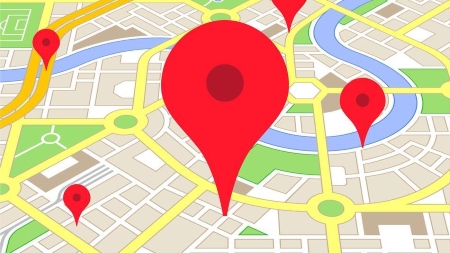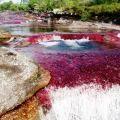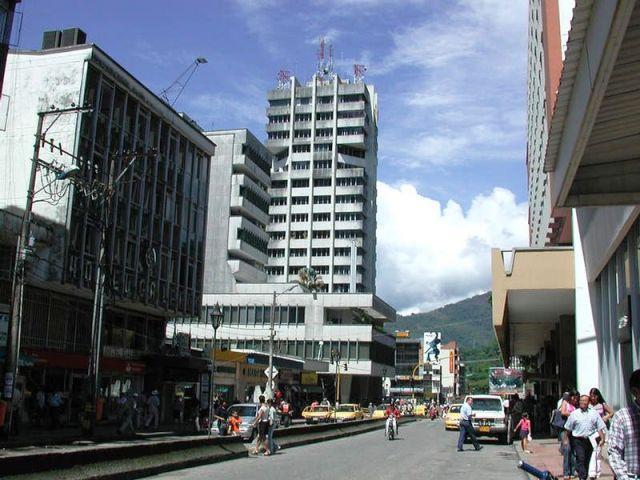Villavicencio, Meta, Colombia
Suggest Place to Visit
2402
Track to location with GPS |
 |
The history of the city dates back to pre-Columbian times when the current Villavicense territory was occupied by the Guayupe Indians, then, around 1740, the Jesuits founded the Apiay Hacienda in which they evangelized both Guayupe indigenous communities and neighboring tribes until 1790 when reasons for the expulsion of the Society of Jesus the lands of Apiay were awarded to Basilio Romero by the Spanish Crown.
On April 6, 1797, the brothers Jacinta and Vicente Rey bought the farm from Mr. Antonio Romero for a sum of 50,000,000 pesos and inherited it from their children who sold their property rights, thus giving rise to the community members of Apiay. .
Due to its geographical location, it became a mandatory route for merchants and ranchers who traveled from Quetame and Fosca (current municipalities of the Department of Cundinamarca) attracted by the fertility and location of the lands; These settlers were established in 1836 and on April 6, 1840, they de facto founded a hamlet on the right bank of the Gramalote channel that gave the town its name. The foundation was made by merchants Esteban Aguirre, Santos Reina and their family. The oldest preserved documents officially acknowledging the founding of the city date from 1842.
It should be noted that what was said in the previous paragraph about the exact date of the founding of Villavicencio belongs to the field of pure theory since the archives in which the documents on the true date of the city's foundation were registered were destroyed during the fire of 1890. .
In 1845 the Cathedral Church of Nuestra Señora del Carmen was built.
On October 21, 1850, the village was renamed Villavicencio in a motion approved by the [Bogota Chamber of Commerce | Bogota Provincial Chamber]] in honor of Antonio Villavicencio y Verástegui, hero of the Independence of Colombia shot by Pablo Morillo.
In 1860 the category of Village is attributed to him.
In 1890 a fire breaks out that devastates the population and destroys files with valuable information for the then village and is moved to its current location. Before the fire, the urban area was in the current Barzal neighborhood.
In 1904 and under the command of Father Maurice Dières Monplaisir, the Monfortiana community was established, which (founded by Saint Louis Maria Grignon de Monfort) was in charge of guiding the social development of the population by founding the San José bank, the Nuestra Señora de la Wisdom, the Verdún theater, the San José printing house, various bookbinding, carpentry and blacksmith workshops, the Santa Cecilia musical band, the Monfort hospital and various libraries. Thanks to these efforts, in 1909 Villavicencio was erected as the capital of the Intendencia del Meta.
1913: the acclaimed poet Eduardo Carranza was born in the village of Apiay, jurisdiction of the municipality of Villavicencio.
In 1921 the De La Salle brothers settled down and founded a school and between 1933-1942 Francisco Olmos built the first bridge over the Guatiquía River.
In 1936 Villavicencio was connected to Bogotá by road.
In 1949 Captain Alfredo Silva, politically affiliated with the Colombian Liberal Party and belonging to the army, rebelled against the then president Mariano Ospina Pérez supported by the National Liberal Directorate but this order was revoked. This does not arrive on time and the captain takes the city starting the first episode of La Violencia en los Llanos Orientales de Colombia and the origin of the Guerrillas del Llano.
In 1953, General Gustavo Rojas Pinilla decreed an amnesty for the guerrillas, thus pacifying the Eastern Plains and producing the massive arrival of settlers from other regions of Colombia.
In 1959 the Department of Meta was created and Villavicencio was ratified as capital.
1962: the Villavicencio Chamber of Commerce is created.
1963: the Villavicencio Public Companies and the Llano Telecommunications Company are created.
1967: In May of this year, the Meta COFREM Regional Family Compensation Fund is created.
1971: the Jorge Eliécer Gaitán House of Culture is created.
1977: the University of the Eastern Plains, better known as Unillanos, is created.
1981: the Electrificadora del Meta-EMSA is created.
1985: the Meta University Corporation, better known as Unimeta, is created.
Villavicencio is a Colombian city, capital of the Meta department, and it is the most important commercial center of the Eastern Plains with an urban population of 384,131 inhabitants (2005 Census). It is located in the foothills of the Eastern Cordillera, west of the Meta department, on the left bank of the Guatiquía River. Its climate is hot and very humid, with average temperatures of 27 ° C.
Villavicencio is located 89.9 km south of the capital of Colombia, Bogotá, two hours along the Autopista al Llano.
Agriculture, livestock, and mining are pillars of the economy of the city developed by an important and agitated commerce, supported by financial resources, which make it the center of development of all the eastern plains.
However, the cultural contribution is the plains trait that best projects its image as a thriving and harmonious people of our time. The song and folklore festivals marked a milestone in the cultural and musical history of the tradition in Colombia. Several melodies born in its festivals have enriched the Colombian cultural heritage, and even the anthem of the department came out of one of these contests. University and technical training centers show the academic support offered by this city, the capital of the Llanos, counting today with 17 universities and more than twenty technical and technological training centers.
In recent years the city has achieved economic development strengthened by the commerce sector, thanks to the dynamics generated by the communication routes that channel the agricultural and agroindustrial industries of the Llano into the interior and the center of the country; as well as that of products that enter the region from different parts of Colombia. Construction activity is very important. The exploitation of gas and oil in the Apiay field is an energy heritage of the region.
It is an important collection center and an obligatory stop for most of the crops and livestock produced in the eastern plains region on their way to the center of the country. In the city or in its surroundings there is an important rice and palm oil processing industry.
Villavicencio also has important shopping centers where tourists can come to do their shopping and find a variety of commercial premises with a great national presence. Some of these shopping centers are:
Llanocentro
This shopping center was inaugurated in 2007, it has 80 commercial premises with an anchor warehouse that is Carrefour, it has Banco Davivienda, Banco Colpatria, Popsy ice cream, ING, TIGO, Drogas la Rebaja, Adidas, among others, the Dann hotel will open very soon Carlton which is located in the same mall. It also has a medical center - Bodytech gym
Unicentro
It was the first large shopping center that opened in the capital, it has a Nursery (now Exito) as an anchor store, you can also find stores such as Studio F, Tommy Hilfiger, Arturo Calle, Americanico, Groggy, Hush Puppies, Fedco, Riviera, Pepe Ganga, Hamburguesas el Corral, Juan Valdéz Café, Procinal, among others.
Savannah
This shopping center has Éxito stores such as Ancla store and Panamericana, the stationery stores, bookstore, etc., it also has Burgers el corral, Studio F, Tennis, Popsy, Lec lee, Al pie, Pat primo, Oma café, among others.
Villacentro
It is the oldest shopping center in Villavicencio, it has movie theaters (multiplex Villacentro), Olímpica warehouses, the main branch of Comcel, Bancolombia, among others.
Home Center
The Chilean home improvement and construction chain Sodimac linked to the Solari family will open a Homecenter store in the city of Villavicencio, Colombia. According to the Colombian newspaper Portafolio, the project will have an investment of US 19.24 million and will have a Homecenter location and another Constructor in a total area of 20,000 square meters, of which 10,000 m2 will be used for the commercial area. The manager of Sodimac Colombia, Carlos Moreno, confirmed to the Colombian media Llano 7 Días that although the opening date has not been defined, the opening will take place during the first half of this year.
In addition to this, it has chain stores nationwide, such as Exito (3), carrefour, alkosto, olimpica (3), makro and panamericana.
Agricultural sector
Among the products of more cultivated hectares are: rice, soybeans, corn, fruit trees, cassava, cotton and cocoa.
Livestock sector
In this area, bovine livestock reports about 88,000 head of cattle, of which approximately 7,200 are milking cows that produce about 24,000 liters of milk per day. In the same way, pig, fish and poultry production for fattening and laying are important.
Mining sector
Although the variety of soils in its jurisdiction provides great benefits, its subsoil also provides it with wealth from the oil fields in the nearby Apiay-Ariari Complex, with its Apiay, Suría and Reforma-Libertad stations, which report a daily average of barrels extracted ranging between 90,000 and 100,000 units (May 2009).
Financial sector
The main financial firms in the country have a seat in the city, almost fifty bank offices, the vast majority with ATM services. Villavicencio has currency exchange offices in the main shopping centers such as Villacentro, los centauros, Unicentro and Llanocentro.
There are various schools of folklore, the most important are among others; Corporación Folclórica El Centauro, Los Taguaros Cultural Corporation, CORPORACION CULTURAL DANZA ARTE Y TRADICION DANZAT, pioneer in the diffusion and massification and internationalization of llanera dance in Europe, the Instituto de Danzas Aires de Colombia THE CORPORACION CULTURAL LLANERA ´´Luís Ariel e Gil Arialdo Rey Roa´´ CORCULLA, a pioneer in performing llaneros shows in Colombia and Venezuela, with his group ´´LOS NIÑOS DEL JOROPO´´, has the largest population, coverage, job creation and infrastructure of the legally constituted artistic schools in the Colombian plain. Official site of the Llanera Cultural Corporation
Non-folkloric artistic manifestations, have taken a boom in recent years; the creation of workshops has allowed the development of different types of art.
To the natural possibilities that its territory offers for rest, the modernization works of the highway are added, which shortened the distance and time of the journey to the capital of the Republic. In this way Villavicencio and other adjacent municipalities are offered today as new tourist destinations. In preparation to meet this demand, tourism development plans and strategies are implemented by the departmental and municipal governments, as well as the Cotelco section. Regarding physical infrastructure, the city has an acceptable hotel inventory, as well as agrotourism farms.
Places of interest
Plaza los Libertadores: it is considered one of the best parks in the capital, located in the center of the city, there are the busts of the Liberator Simón Bolívar and General Francisco de Paula Santander.
The Cathedral of Nuestra Señora del Carmen: in 1845 the parish priest of San Martín, Ignacio Osorio, passed through the town of Gramalote, who suggested and convinced the residents of the village that a chapel should be built which, in addition to being a refuge for Catholics and believers, would initiate the demarcation of a square that symbolizes the population.
The initiative was welcomed by the locals who offered to build it. Three years later, in 1848, the priest returned and found the task rudimentary finished; He blessed her by placing her under the protection of Our Lady of Carmen.
Monument to Cristo Rey: located in the upper part of the city, on the hill called El Redentor, from which we can see the city in all its extension and beauty. Work started in 1949 by Pedro Elíseo Achury Garavito and inaugurated in 1954.
Monument to the Founders: it was the last work made by the renowned Colombian sculptor, Rodrigo Arenas Betancourt, it is located in the park that bears the same name on the road that leads from Villavicencio to Acacías.
Los Ocarros Biopark: 3 km north along the road that leads to Restrepo and Cumaral, around the lake that forms the waters of the Vanguardia channel and as the gateway to the natural reserve of the same name. It is the only zoological institution in the country dedicated exclusively to the preservation of regional natural resources, which integrates the biodiversity of fauna, flowers and ecosystems of the Colombian Orinoquía in an integral way.
Las Malokas Park: scenario designed with the new concept of the theme park, where a permanent exhibition of the world of the horse, of the culture and idiosyncrasy of the plains will be presented through the environment of a HATO LLANERO represented with a typical house, stables, work of plain, coleo, cattle corrals, jagüey and an area destined to the cultivation of yucca, topocho and pancoger plantain called "conuco".
Casa de la Cultura ´´Jorge Eliécer Gaitán´´: founded on June 11, 1971, encourages, stimulates and disseminates cultural manifestations, it has a public library, which in turn provides school library services. It also has the Villavicencio Cinema Club, where films of great cultural quality are shown; it also has a School of Arts.
CATAMA Agroindustrial and Livestock Complex: located 7 km from the city, via Caños Negros, owned by the Meta Livestock Fund. It is one of the most important complexes for the department. There the most important Livestock and Agroindustrial Exhibition Fair in the department is held. Site of tourist interest for its cattle markets and its beautiful architectural structure.
Monument to the Fallen in Action: located at ´´km 8´´ on the road to Puerto López. Monument that stands in honor of the assassinated General Carlos Julio Gil Colorado and the soldiers who died in combat.
Parque de la Vida: built in favor of the community, it is located at one end of the Avenida Circunvalar; it has a conference room, destined for cultural exhibitions; restaurant service, swimming pools for children and adults and open fields for recreation; Due to its beauty and perfection, it stands out as one of the main centers of attraction, recreation and sport for the youth of the Llanera.
Journalists Park: received this name on February 9, 1987, in agreement with the Mayor's Office and the Council and the Circle of Journalists of Meta. Before it was called ´´Parque Infantil´´.
Students' Park: it received this name as a result of the death of students Alexis Umaña and Yesid Castañeda, in 1974. The monument that stands there was called ´´Espirit y Sangre´´, in homage to the people who fight for their liberation . It was prepared by the teacher Álvaro Vásquez.
Concha Acústica ´´Arnulfo Briceño Contreras´´: a recreation site called a tourist lookout, where we can observe part of the city's landscape, created in order to present musical, folkloric and cultural events to the llanera, Colombian and international community.
Plaza de Banderas: inaugurated on April 6, 1985, the design and direction of the work were in charge of the municipal administration with the help of the communities. The poles and the material for its execution were donated by the community action boards . It is worth noting that there stands the bust of the hero of independence Antonio Villavicencio y Verástegui, after whom the name of the city was adopted.
Glorieta de La Grama: located on the old road to Bogotá D.C., from there the road for Restrepo, Avenidas del Llano and Alfonso López to the city center. In its center there is a light source called "Caño Cristales" where the seven characteristic colors of this natural beauty stand out.
Sikuani Park: located to the east of the city with mechanical games, recreational and sports scene with eight tennis courts, basketball, swimming pools with slides, gym, spinning and pedestrian paths.
Plazoleta los Centauros: cultural center where inhabitants and tourists meet to appreciate the different manifestations of the folklore of the Llanero.
Comments
We don´t have yet any comments about:
Villavicencio
Villavicencio
Be the first to leave a comment as it is very important to inform other people
Outros locais a visitar
Within a radius of 20 km from:Villavicencio
Caño Cristales River (Villavicencio) |
| 2,6 Km |
 |
Hotel reservation near Villavicencio within a radius of 20 km
Why to book with TOURISTIC ROUTES
The best prices
Our partnerships with the world´s largest operators offer research on the best market prices.
More options
At Rotas Turisticos you can book the hotel, buy the air ticket, book the transfer from the airport to the hotel and vice versa, book the local excursions, rent the car, take travel insurance and consult the places to visit and where to go.
Holiday Tips & Destinations
Hundreds of holiday destinations with all the options that allow you to easily choose the destination that best suits your dream vacation.
TOURISTIC ROUTES
Links






